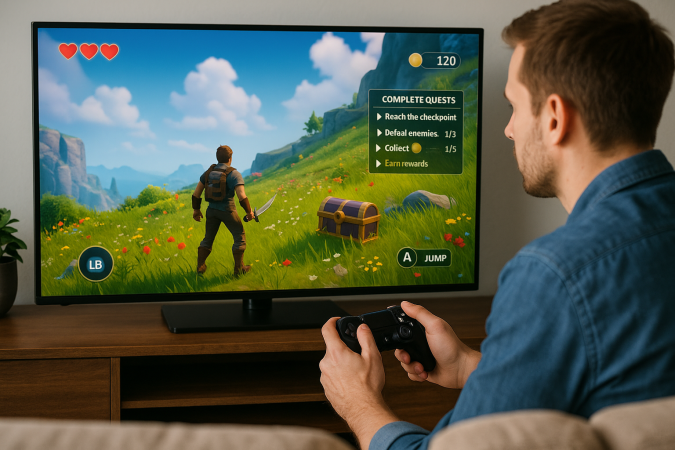These days, gaming is a full-blown sensory experience. Games are pulling you into worlds packed with goals to chase and people to battle against. From epic adventures to fast online shooters, game developers know exactly how to keep us playing for longer. Whether you’re playing a game of adventure, competing as an online shooter, or enjoying a casual mobile game, developers are mastering the art of keeping players engaged. They have learnt how to keep you wanting more. Every level, every achievement, and every little victory has been designed to keep your brain happy, engaged, and wanting “just one more round.”
Let’s dive into some of the key points that keep players engaged.
The Rise of Skill-Based Casino Games
One of the most interesting areas where gaming mechanics have crossed over is the iGaming sector. These are online casino gaming platforms, much like traditional casino games, where you can play slots, poker, live dealer games, and most recently, crash gambling games.
This popular genre allows players to bet on a multiplier that continuously increases from the starting point during each round. For example, fish gambling shooter games or fish table games combine arcade-style shooting with gambling elements. Players use a mounted cannon to shoot various virtual fish swimming across the screen. Each fish varies in size, rarity, and speed. The bigger or rarer the fish, the higher its monetary value is.
Several online casino platforms, like the platforms reviewed by PokerStrategy, offer different variations of fish table games, each with its own RTP and difficulty level to suit beginners and experienced players. They also provide players with various bonuses and several different ways to pay. This mix of interactive gameplay and reward loops makes the experience far more immersive than typical slots. It bridges the gap between gaming and gambling, appealing to the generation who have been raised on smartphones and consoles.

Gamer Joystick Controller – Free photo on Pixabay
Rewards and Progression
Progressing in games is just so satisfying. Today’s games make sure you always feel like you’re moving forward. Climbing up levels, adding to your virtual gear collection, or unlocking new abilities feels great. Humans are hard-wired to achieve, and progression systems tap into that. Each milestone is a small victory. Role-playing games like Elden Ring or Final Fantasy XIV can often keep players captivated for hours. Even casual mobile games are using this technique cleverly. A steady loop of challenge and reward keeps your brain happily engaged.
Creating Community Connection
Modern gaming has become about belonging, not just playing. Whether it’s teaming up with friends in Fortnite, joining a guild in World of Warcraft, or competing in online leaderboards, the community has become a central pillar of engagement. Social mechanics have made gaming personal. Team missions build camaraderie, competitive play drives mastery, and achievements won create lasting memories for gamers. Developers know that when players form friendships or rivalries within a game, they’re far more likely to stick around. It has changed gaming from a solo pastime into a shared experience that keeps people logging back in.
The Psychology of Changing Rewards
A big part of what keeps players coming back is unpredictability. Game designers use changing reward schedules so that the outcome isn’t guaranteed. Sometimes you can have big wins, sometimes you just bomb out. That unpredictability is the same as opening a mystery box. The anticipation of finding out what’s inside is a thrill. Loot boxes and random item drops use this mechanic effectively. It’s that feeling of “just one more try” that can turn a quick gaming session into a marathon.
Narrative and Emotional Engagement
A major factor that keeps players invested is the fantastic storytelling features. Games today are about living a narrative, not just beating levels. Developers have built emotional depth into the characters and world-building. Titles like The Last of Us Part II or Life is Strange show how emotional storytelling can rival movies in intensity. When players have an emotional attachment to characters and feel responsible for outcomes, they’re more likely to stay engaged. It’s moved beyond gameplay, because the story’s conclusion matters too. A compelling story can make all the difference, whether it’s an epic drama or a quirky sense of humor; it has become a factor in keeping people playing.
Updates and Live Events
A surefire way to keep players coming back is by keeping the game alive. Live-service models have changed gaming into something more fluid and ever-evolving. Seasonal challenges, frequent updates, and limited-time events ensure there’s always something new to discover. For gameplay that rewards skill, some games allow you to build your dream team and have live events to look forward to. It’s about keeping players engaged through the anticipation of what’s next. This approach creates a sense of ongoing community participation. Players feel part of something that’s constantly changing, which subtly encourages continued engagement.
Player Identity
Everyone loves to feel unique, and for gamers, this has become a reality. They can design a character’s appearance, tweak gear loadouts, and decorate in-game spaces. These games use this kind of personalization that ensures the experience feels like it is truly your own. Many games allow you to customize items, and avatars allow players to express themselves. People are far more likely to invest their time in a world that reflects their own identity and allows them to express their creativity.
Challenge and Mastery
Finally, no engagement system works without challenge. The sweet spot between “too easy” and “too hard” keeps players in the flow state, fully focused and living in the moment. Modern games use leaderboards and achievement systems to encourage mastery. Players feel rewarded not just by winning, but by getting better. Skill growth is its own reward.
Conclusion
Whether it’s earning loot in a fantasy RPG, mastering the fish game in iGaming, or teaming up with friends for a weekend raid, the principles of progression, connection, and emotion apply. For players, that means one thing: there’s never been a more exciting time to play.

